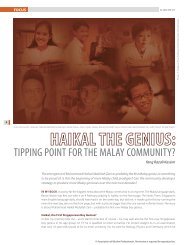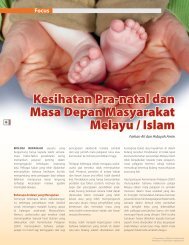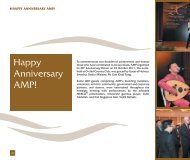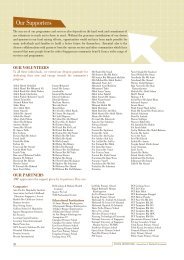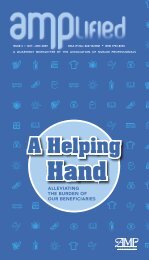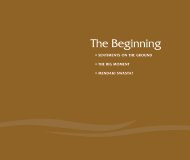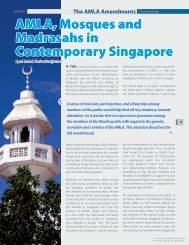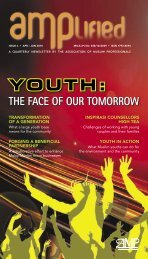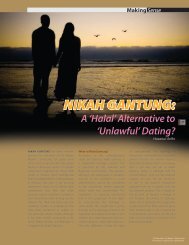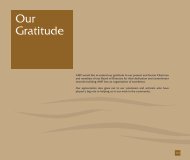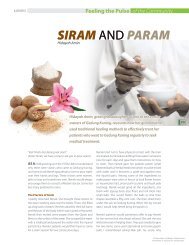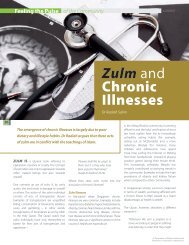The AMLA Amendments - Association of Muslim Professionals
The AMLA Amendments - Association of Muslim Professionals
The AMLA Amendments - Association of Muslim Professionals
You also want an ePaper? Increase the reach of your titles
YUMPU automatically turns print PDFs into web optimized ePapers that Google loves.
KARYAWAN <strong>The</strong> <strong>AMLA</strong> <strong>Amendments</strong> Socio-Economy<br />
‘And what if a person has not done up a will This is something that I think we have to<br />
look at too. <strong>The</strong>re is a concept called Wasiyah Wajibah – obligatory bequeath.’<br />
law, we only implement the distribution <strong>of</strong> inheritance according<br />
to Faraid, but we do not implement the responsibility that comes<br />
with it, as demanded by the Quran.<br />
Joint Tenancy<br />
Another consideration is the issue <strong>of</strong> fatwa and statutory position.<br />
By statutory position, I mean certain aspects that are governed<br />
by civil law such as joint tenancy and CPF nomination. Under<br />
joint tenancy in civil law, when the husband dies, the wife gets<br />
ownership <strong>of</strong> the house. <strong>The</strong> fatwa – as specified in MUIS Fatwa<br />
Book 3, first edition, Q 57, pp 38 – rules differently. <strong>The</strong> wife will<br />
not get full ownership <strong>of</strong> the house. Half goes to her and the<br />
other half to the estate <strong>of</strong> the deceased. Legally, this fatwa is not<br />
binding in court; you cannot enforce it.<br />
However, many housewives feel pressured to sell their house to<br />
conform to the fatwa. So here, there is a need to look at the<br />
fatwa on joint tenancy and how we can harmonise it with the<br />
joint tenancy contract under civil law. <strong>The</strong> joint tenancy contract<br />
is actually Islamic in spirit and essence. But for some reason, it is<br />
not yet applied as an Islamic contract on <strong>Muslim</strong>s because the<br />
concept <strong>of</strong> Hibah (Gift) in joint tenancy has not been incorporated<br />
by the fatwa. It is something that we have to relook.<br />
CPF Nomination<br />
One other thing; if there is a nomination on inheritance, the estate<br />
goes to the spouse or whoever has been nominated. But this is not<br />
the case with the fatwa related to this. So there is a disharmony<br />
between what is practised under civil law and the fatwa. Is there<br />
a way for us to harmonise these two laws I believe there is. <strong>The</strong>re<br />
are Islamic laws that are quite close to the concept <strong>of</strong> nomination<br />
that can actually be accepted. However, because we do not see<br />
these as instruments <strong>of</strong> estate transfer, as though Faraid is the only<br />
reference, we are not able to harmonise these two laws.<br />
No CPF Nomination<br />
On the issue <strong>of</strong> no nominations for CPF, there is also a disharmony<br />
<strong>of</strong> the laws. When a <strong>Muslim</strong> dies without nominating any<br />
beneficiary to his CPF account, the CPF funds will go to the Public<br />
Trustee. <strong>The</strong> Public Trustee will dispose <strong>of</strong>f this money based on<br />
the <strong>Muslim</strong> Law. That is also prescribed in the CPF Act.<br />
However, the current practice is based on both the Certificate <strong>of</strong><br />
Inheritance (COI) – which is issued by the Syariah Court – and the<br />
Faraid formula <strong>of</strong> distribution, which is one aspect <strong>of</strong> the Islamic<br />
law on inheritance.<br />
For example, if a man dies and leaves behind a wife and children,<br />
under <strong>Muslim</strong> law, the wife should get half <strong>of</strong> the husband’s<br />
assets, plus 1/8th <strong>of</strong> the other half (50% + 6.62% = 56.25%). <strong>The</strong><br />
first half is her entitlement as Harta Sepencarian – that is her share<br />
<strong>of</strong> the assets accumulated jointly during the marriage. <strong>The</strong> other<br />
half is the husband’s estate to which she is entitled 1/8th <strong>of</strong>.<br />
However, based on the current practice, Faraid, which is one <strong>of</strong><br />
several tools <strong>of</strong> estate distribution, stipulates that she will get<br />
only 1/8th (12.5%) <strong>of</strong> the assets. This is because the total assets<br />
will be distributed as belonging to the deceased husband’s. Harta<br />
Sepencarian should not be part <strong>of</strong> the husband’s net estate, as it<br />
is the wife’s assets. <strong>The</strong> current practice <strong>of</strong> including the wife’s<br />
asset as part <strong>of</strong> the husband’s Faraid distribution should therefore<br />
be reviewed.<br />
Responsibility, Faraid and Will<br />
<strong>Muslim</strong> law is not just about Faraid. This is an important fact. <strong>The</strong><br />
responsibility that comes with Faraid is however not enforced at all.<br />
Suppose my wife and I have three adopted children. Under Faraid,<br />
my sons get nothing (because they are adopted) and my wife gets<br />
1⁄4 <strong>of</strong> my property. <strong>The</strong> rest <strong>of</strong> the property will go to my siblings<br />
and not my adopted sons. <strong>The</strong> question is how will my wife support<br />
my children after my death While the law enforces the estate<br />
distribution formula, the law does not enforce the responsibility<br />
that comes with it. Why are we not enforcing the responsibility <strong>of</strong><br />
the siblings to look after the children <strong>of</strong> the deceased when the<br />
Quran demands it<br />
And what if a person has not done up a will This is something<br />
that I think we have to look at too. <strong>The</strong>re is a concept called<br />
Wasiyah Wajibah – obligatory bequeath. In the case <strong>of</strong> a person<br />
who dies without a will, the court can enforce it like a will had<br />
been made for him. For example, I have an adopted son and<br />
when I die intestate, there is nothing for my son because he is<br />
adopted. <strong>The</strong> court can however enforce up to 1/3 <strong>of</strong> my<br />
property to be given to him as Wasiyyah Wajibah. This is<br />
something that is practised in Malaysia and Indonesia, but<br />
not in Singapore yet.<br />
Sadali Rasban is Managing Director <strong>of</strong> HTHT Advisory<br />
Services Pte Ltd, a company specialising in Islamic estate<br />
planning and wealth management. <strong>The</strong> Karyawan Forum on<br />
<strong>AMLA</strong> was held at AMP on 25 October 2008.<br />
17



